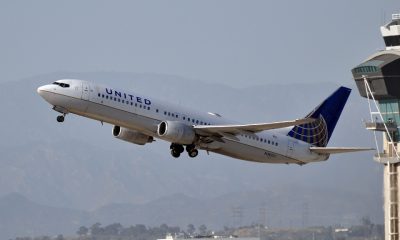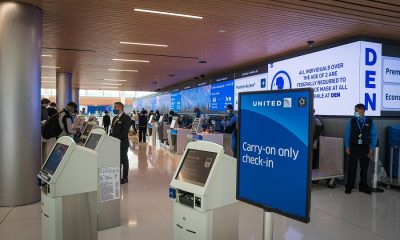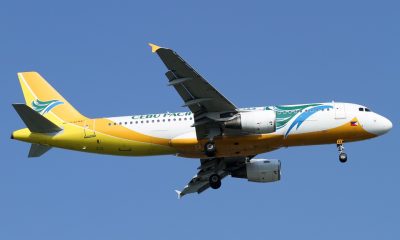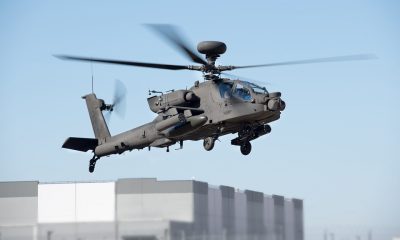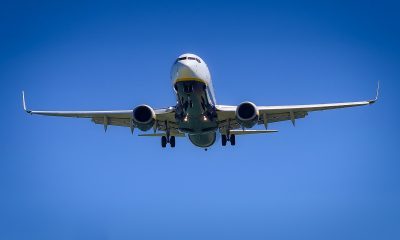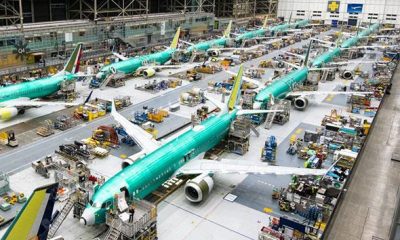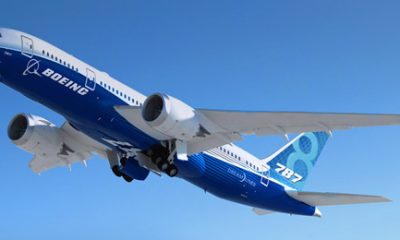Aerospace
Boeing, NASA, United Airlines To Test SAF Benefits with Air-to-Air Flights
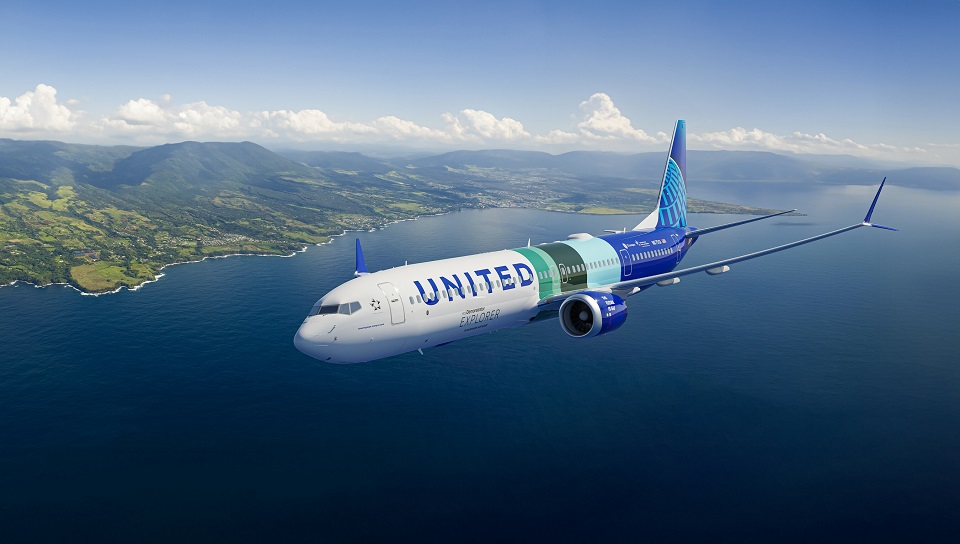
Boeing is working with NASA and United Airlines to conduct in-flight tests to determine how sustainable aviation fuel (SAF), which reduces the fuel’s climate effect during its life cycle, affects contrails and non-carbon emissions.
In order to conduct testing, United Airlines’ 737-10, Boeing’s second ecoDemonstrator Explorer, will fly with 100% SAF and regular jet fuel in separate tanks as well as alternative fuels. NASA’s DC-8 Airborne Science Lab will follow the commercial aircraft and track the emissions from various fuel types and ice particles in the contrail.
As part of the experiment, NASA satellites will take pictures of the production of contrails. The researchers aim to understand how advanced fuels, engine combustor designs and other technologies may reduce atmospheric warming.
For example, tests will assess how SAF affects the characteristics of contrails, the persistent condensation trails produced when airplanes fly through cold, humid air. While their full impact is not yet understood, some research has suggested certain contrails can trap heat in the atmosphere.
World Energy is supplying SAF for the tests from its Paramount, Calif., facility. Additional support includes:
- U.S. Federal Aviation Administration (FAA) is providing funding through the ASCENT Center of Excellence
- GE Aerospace is providing technical expertise and project funding
- German Aerospace Center (Deutsches Zentrum für Luft- und Raumfahrt or DLR) is providing experts and instrumentation
The study is the most recent stage in a multi-year collaboration between NASA and Boeing to examine how SAF can lower emissions and provide other environmental advantages. SAF, which is created from a variety of sustainably produced feedstocks, has the greatest potential to cut aviation CO2 over the next 30 years and can lower emissions by up to 85% compared to traditional jet fuel. The air quality near airports may be improved by SAF’s reduced soot production.

Aerospace
NASA’s Ambitious Plan to plant trees in moon

In a groundbreaking move, NASA is gearing up to embark on a mission unlike any before: planting trees on the moon. This ambitious endeavor marks a significant leap forward in lunar exploration and sustainability efforts.
With the aim of expanding understanding of extraterrestrial environments and potentially laying the groundwork for future colonization, this initiative captures the imagination and pushes the boundaries of space exploration.
The project, aptly named Lunar Effects on Agricultural Flora (LEAF), is slated for a September 2026 lunar landing. It represents NASA’s inaugural endeavor to grow vegetation in the harsh conditions of space, holding the promise of revolutionizing the way we envision sustaining future space missions.
At the heart of this endeavor lies a miniaturized lunar greenhouse, a testament to human ingenuity and technological advancement. The LEAF project aims to explore the feasibility of cultivating crops in space, a crucial step towards establishing sustainable habitats beyond Earth.
But why duckweed, cress, and brassica, you may wonder? These selected plants represent more than just foliage; they symbolize resilience and adaptability in the face of challenging environments. Through rigorous experimentation, scientists aim to unlock the secrets of plant growth in microgravity, paving the way for self-sustaining extraterrestrial ecosystems.
Space Lab Technologies leads the charge on this ambitious project, joined by esteemed partners such as the University of Adelaide, La Trobe University, and the United States Department of Agriculture, among others. Together, they form the Plants for Space (P4S) consortium, pooling expertise and resources to tackle the complexities of space agriculture.
“Importantly too, the technologies and practices developed as part of Plants for Space will improve life on Earth and benefit all Australians by addressing challenges like food security and water scarcity,” highlights a spokesperson for the project. Indeed, the implications of this research extend far beyond the confines of our celestial neighbor, offering solutions to pressing issues facing humanity on Earth.
Aerospace
Etihad Pilots Granted Dual Certification for A350 and A380 Operations
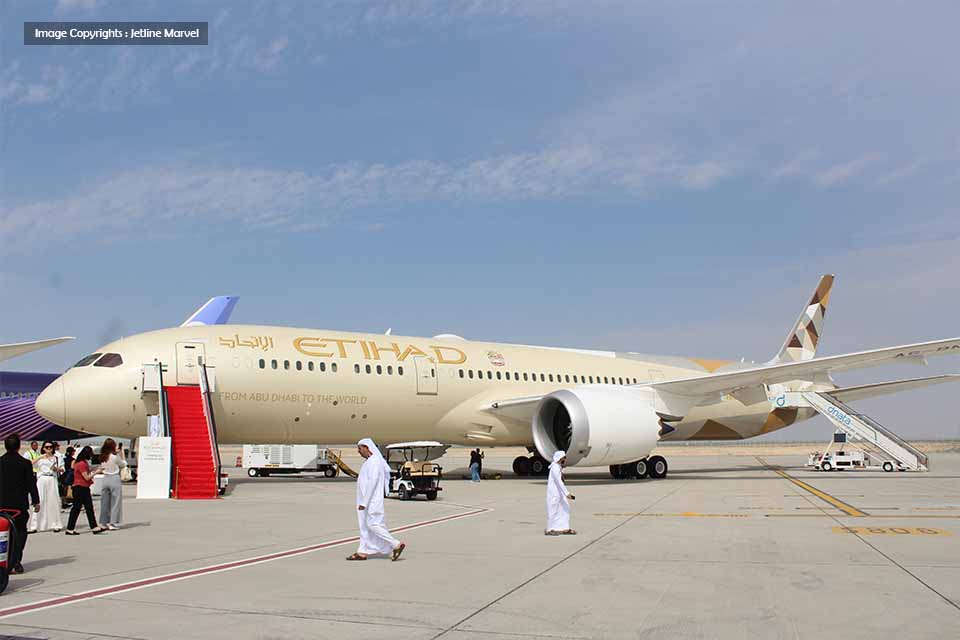
Etihad Airways, the flag carrier airline of the United Arab Emirates, has achieved a significant milestone in its pilot training and operational capabilities.
After rigorous training and regulatory approvals, Etihad’s pilots are now qualified to fly both Airbus A350 and A380 aircraft interchangeably. This accomplishment underscores Etihad’s position as a global leader in diversifying its pilot skill set.
Traditionally, pilots are trained to operate a specific type of aircraft. However, through specialized training programs and regulatory approvals, pilots can be authorized to fly multiple similar aircraft types with comparable flight decks and protocols.
This practice, known as “Mixed Fleet Flying” (MFF), requires approval from both aviation authorities and aircraft manufacturers.
Over the past decade, Etihad has been at the forefront of fleet commonality by enabling its pilots to operate various Airbus models such as the A320, A330, and A340, as well as Boeing models like the 777 and 787.
This latest authorization to fly the Airbus A350 and A380 further enhances Etihad’s operational efficiency and flexibility, particularly within its widebody aircraft network.
Aerospace
Embraer and Mahindra Join Forces for India’s Medium Transport Aircraft Project
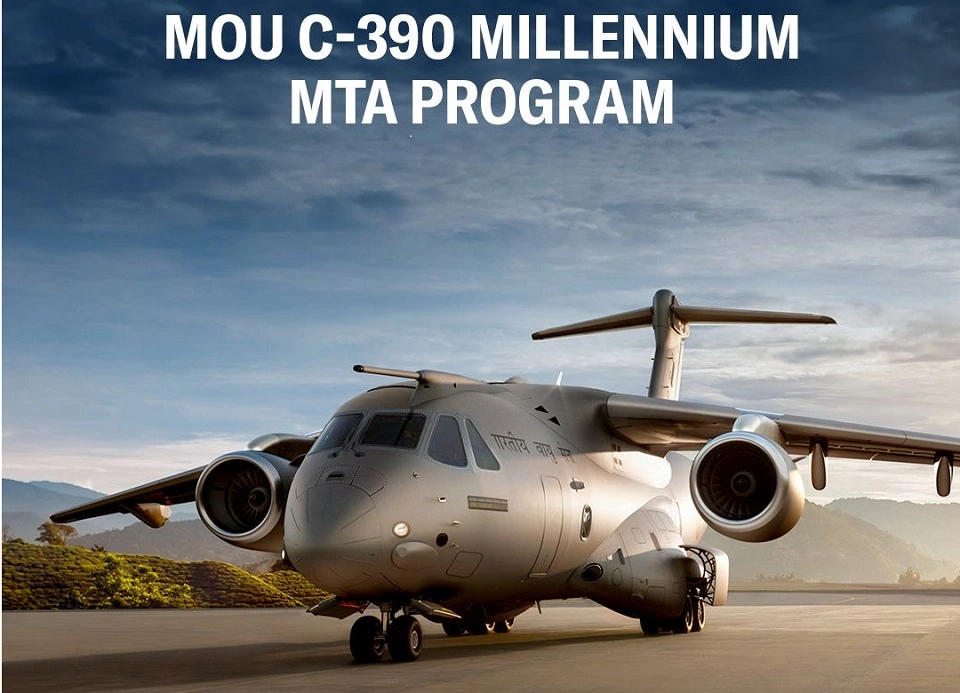
New Delhi, February 9, 2024 – Embraer Defense & Security and Mahindra have announced the signing of a Memorandum of Understanding (MoU) aimed at collaborating on the acquisition of the C-390 Millennium multi-mission aircraft by the Indian Air Force as part of its forthcoming Medium Transport Aircraft (MTA) procurement project. The MoU was formalized at the Embassy of Brazil in New Delhi.
“We are privileged to unveil this MoU with Mahindra. India boasts a robust and diverse defense and aerospace sector, and we have selected Mahindra as our partner to jointly pursue the MTA program,” stated Mr. Bosco da Costa Junior, President & CEO of Embraer Defense & Security. “India holds significant importance for Embraer, and we are fully supportive of India’s vision for ‘Atmanirbhar Bharat.’ This collaboration signifies the strengthening of ties between Brazil and India and underscores our commitment to fostering cooperation among nations of the Global South.”
Embraer and Mahindra will collaborate closely with the Indian Air Force to delineate the subsequent stages of the MTA program, as well as engage with the indigenous aerospace industry in India to initiate the industrialization blueprint for the project.
Mr. Vinod Sahay, President of the Aerospace & Defence Sector and Member of the Group Executive Board at Mahindra, remarked, “We take great pride in commencing this partnership with Embraer, a company renowned for its engineering prowess and an exceptional array of aircraft and systems. The C-390 Millennium stands out as the most advanced military airlifter available, and we are confident that this collaboration will not only enhance the operational capabilities of the Indian Air Force but also deliver an efficient industrialization solution that seamlessly aligns with the Make in India initiative.”
The MoU was inked by Embraer Defense & Security and Mahindra Defence Systems, a wholly owned subsidiary of Mahindra, focusing on armored transport and security-related products, including electronics.
Embraer has established a strong presence in India across defense, commercial aviation, and executive aviation sectors. In August 2023, Embraer organized a C-390 Millennium Day in New Delhi, India, to deepen its engagement with the local aerospace industry, attracting significant participation from the Indian ecosystem.
The C-390 Millennium multi-mission tactical transport aircraft offers unparalleled mobility, blending high productivity and operational flexibility with low operating costs, making it an unrivaled choice.
Since its introduction into service with the Brazilian Air Force in 2019 and more recently with the Portuguese Air Force in 2023, the C-390 has demonstrated its capability, reliability, and performance. The current fleet of operational aircraft has accumulated over 11,500 flight hours, achieving an operational availability of approximately 80% and mission completion rates exceeding 99%, showcasing exceptional productivity in its class. The C-390 Millennium attained Full Operational Capability status by the Brazilian Air Force in 2023, underscoring its ability to execute all designated missions.
To date, the C-390 Millennium has been chosen by Brazil, Portugal, Hungary, the Netherlands, Austria, the Czech Republic, and most recently, South Korea.
Aerospace
India’s Sarang Helicopter to Perform Aerial Display at Singapore Airshow 2024
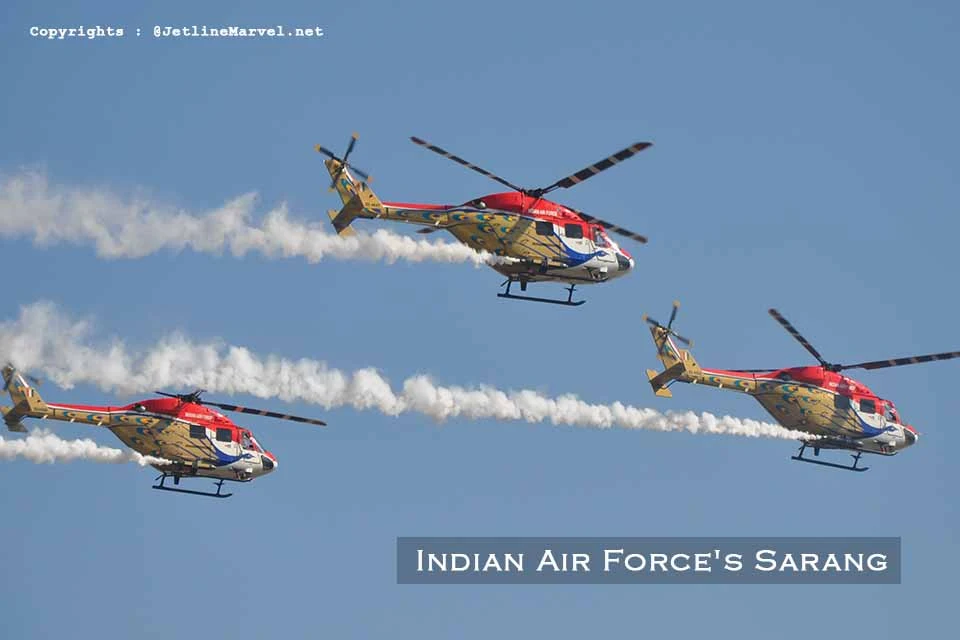
The Singapore Airshow 2024, set to take place at the Changi Exhibition Centre from February 20 to 25, will feature a captivating lineup of eight aerial displays, including flypasts from six air forces and two commercial companies.
This year’s showcase boasts the highest number of international flying teams, with the Indian Air Force’s Sarang performing its aerobatic maneuvers for the first time at the Singapore Airshow. Joining them are renowned teams like the Royal Australian Air Force’s Roulettes, the Indonesian Air Force’s Jupiter, and the Republic of Korea Air Force’s Black Eagles. Additionally, the United States Air Force’s B-52 Stratofortress will grace the skies with a fly-past on February 22.
Leading the spectacle is the Republic of Singapore Air Force’s integrated aerial display team, featuring an F-15SG fighter jet and the AH-64D Apache attack helicopter.
COMAC C919 at Singapore airshow 2024
Making its debut appearance at the air show in Singapore is the C919, a narrow-body airliner developed by Chinese aircraft manufacturer COMAC. This participation marks a significant milestone for Asia’s premier aerospace and defense event. Enthusiasts can also anticipate the return of Airbus’ A350-1000, showcasing its exceptional blend of elegance and efficiency. This time Boeing is displaying its cabin interior of 777x Singapore airshow.
Mr. Leck Chet Lam, Managing Director of Experia, the organizer of the Singapore Airshow, expressed excitement about the flying performances, emphasizing their significance as a highlight of the event. Given the limited access during the previous editions due to pandemic safety measures, strong interest is anticipated this year.
The flying displays will take place once a day at 12:30 pm on February 20 and at 11:30 am on February 21 and 22. During Weekend@Airshow (formerly known as Public Days), displays will be held twice a day at 11:30 am and 2:30 pm on February 24 and 25. However, schedules and timings are subject to change, and attendees are advised to check the Singapore Airshow website for updates.
Singapore air show tickets
Tickets for Weekend@Airshow are available for purchase through SISTIC at the following prices: SGD$34 for adults, SGD$17 for children aged 3 to 12 years, and SGD$240 for the group package, which includes four tickets and one car park label.
Aerospace
Emirates Aviation University and Boeing Team Up to Ignite Aeronautical Career Passion
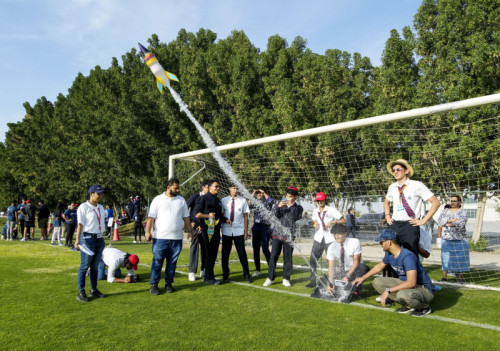
In partnership with Boeing, Emirates Aviation University hosted its seventh Water Rocket Competition, where 202 students from 24 UAE schools made a big splash.
With available materials, eleventh and twelfth graders from schools throughout the United Arab Emirates constructed rockets. Every year, participants are tasked with using only water and air pressure to launch water rockets at a 45-degree angle.
For improved impact protection, students create imaginative fins and nose cones. They pick up skills in reduction, reuse, and recycling during the competition. Teams were given two hours to finish the task and two chances to launch their rockets this year.
Professor Ahmad Al Ali, Vice Chancellor of Emirates Aviation University, said: Emirates Aviation University is dedicated to innovation and developing young people’s creative thinking. Not only is the annual Water Rocket Competition thrilling for the student community, but it’s also a chance to challenge and inspire the nation’s finest young brains to consider careers in STEM fields.
Every year, it’s enlightening to watch how students collaborate, think creatively, and build these rockets. We hope this will motivate them to pursue careers in science and engineering as leaders. We appreciate Boeing’s assistance in making this challenge a success once more.
Eagle 1 from Islamiya English School in Abu Dhabi was declared the winner school by the Emirates Aviation University and Boeing judging panel after the water rocket launches. The team launched their rocket up to a distance of 99 metres. With 93 metres, Eagle 2 from Islamiya English School in Abu Dhabi took first place as the runner-up, followed by OOW – Volts from Own High School in Dubai in second place with 92 metres.
The annual competition combines creativity with the fundamentals of flight and rocketry to inspire the next generation of aviation enthusiasts.
Aerospace
Boeing-built X-37B Orbital Test Vehicle Embarks on Seventh Mission
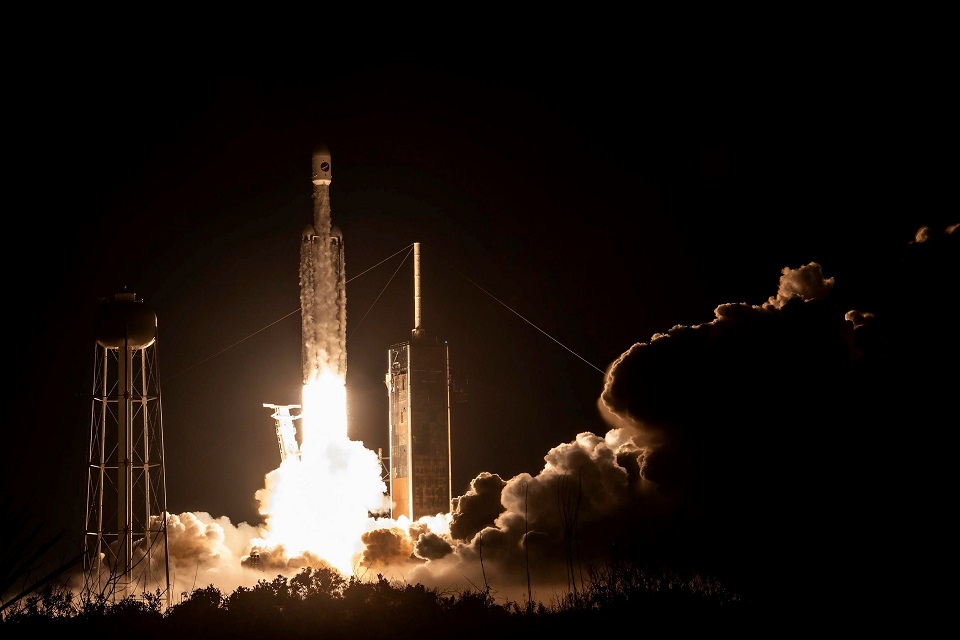
Beginning its seventh mission, the Boeing-built X-37B autonomous spacecraft took off yesterday atop a SpaceX Falcon Heavy rocket.
The Orbital Test Vehicle, as it has on every mission, will verify novel technologies, encouraging creativity and expanding the frontiers of space exploration and utility. boeing orbital flight test 2 The X-37B will test upcoming space domain awareness technology experiments on this seventh flight, which is essential to guaranteeing safe, stable, and secure operations in space for all users of the domain.
Ever since its first launch in April 2010, the X-37B has routinely broken endurance records, going above and beyond the original mission design duration of 270 days. Prior to arriving back on Earth in November 2022, its sixth mission accomplished an astounding 908-day journey, setting a new record.
The X-37B is a prime example of the Department of the Air Force Rapid Capabilities Office and the United States Space Force’s successful collaboration. It will now expand on its more than 1.3 billion miles travelled during its 3,774 days in space. Programme management, engineering, production, testing, and mission support are all provided by Boeing teams.
Aerospace
5 fascinating facts about IL-76 Aircraft
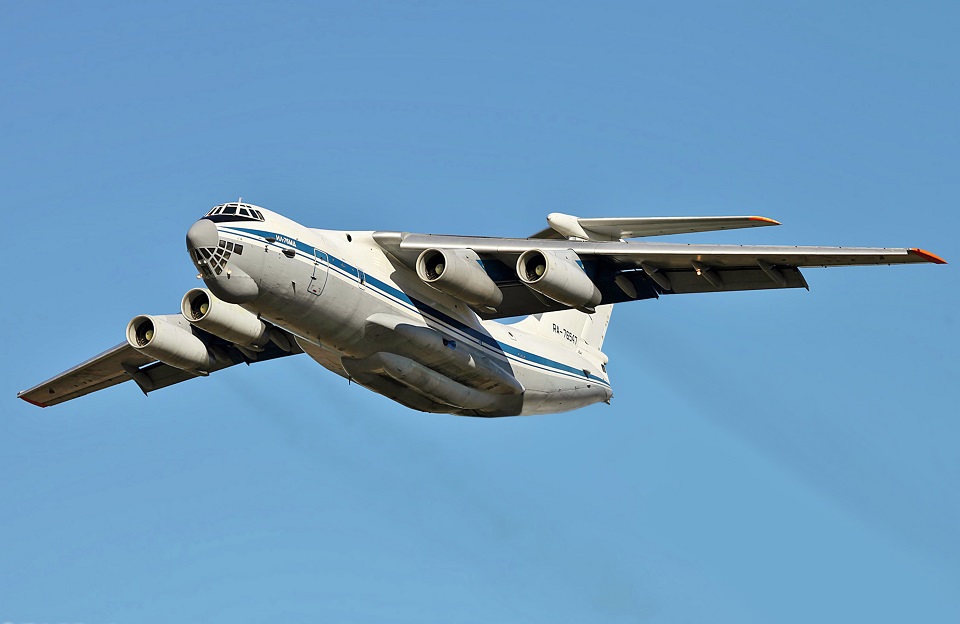
The Ilyushin design bureau of the Soviet Union created the multifunctional, four-engine turbofan strategic airlifter known as the Ilyushin IL-76. Airborne early warning and control, cargo transport, firefighting, and other functions have all been performed by the IL-76, an aircraft originally designed for military use.
Here are five unique and fascinating facts about the IL-76 aircraft.
1. It is well known that the IL-76 is an outstanding aircraft for strategic airlifting. It is capable of transporting a variety of cargo, such as heavy gear, military hardware, and humanitarian aid, with a maximum payload capacity of about 50 tonnes. Because of its adaptability, it has been used extensively in both military and humanitarian operations worldwide.
2. The IL-76 has several unexpected uses, including battling fires. The IL-76TD and IL-76TD-90VD are modified aircraft that have been fitted with a water-dispensing system and tanks that can hold up to 42 tonnes of water or fire retardant. With this upgrade, the IL-76 becomes an effective weapon against wildfires in difficult-to-reach areas.
3.For early warning and control missions from the air, the IL-76 platform has been modified. An extensive radar fixed atop a revolving disc above the fuselage is fitted to the IL-76-derived A-50 Mainstay. Strategic defence and reconnaissance greatly benefit from the long-range surveillance and command and control capabilities of this radar system.
4.The IL-76 was first developed during the Cold War to support Soviet military and strategic transport requirements. After its first flight in 1971, it rapidly established itself as a mainstay of Soviet and then Russian military activities. Strongness, adaptability, and the capacity to function in a variety of conditions are highlighted in the aircraft’s design, which reflects the geopolitical and military concerns of the day.
5.The IL-76 performs better in short fields as a result of a unique reverse thrust system. Four turbofan engines powering the aircraft each have a thrust-reverser system. This characteristic makes the IL-76 appropriate for a range of mission profiles and environments by enabling it to operate from a variety of airfields, including those with shorter runways.
Aerospace
IAF’s Rafale fighter jets hunt for ‘UFO’ sighted near Imphal
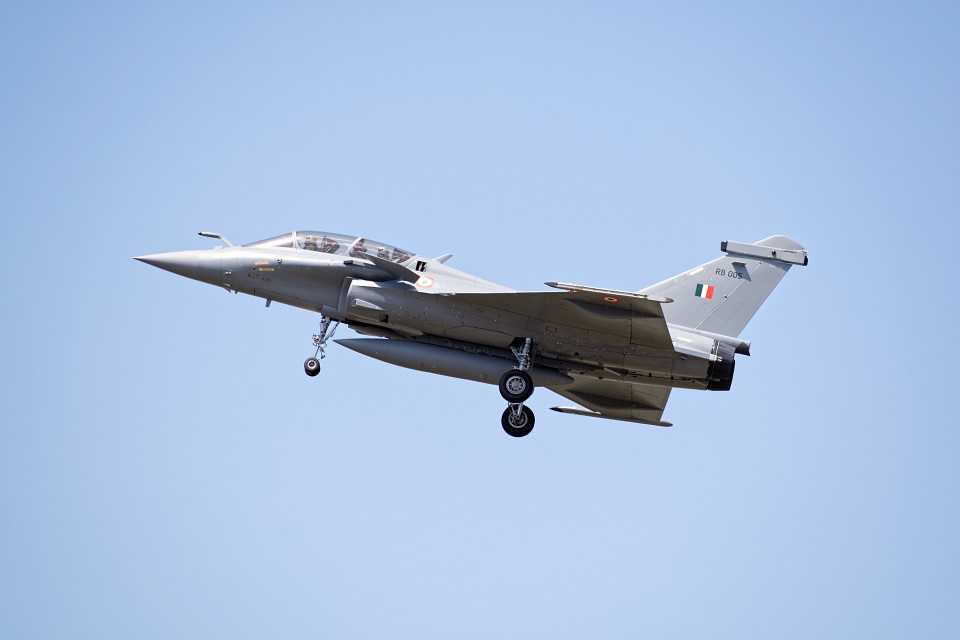
The Indian Air Force received information on Sunday about the sighting of unidentified flying objects near the Imphal airport.
The IAF quickly dispatched its Rafale fighter planes to search for them. The UFO was spotted over Imphal airport around 2.30 p.m., disrupting a few commercial flights. “Soon after information about the UFO near the Imphal airport was received, a Rafale fighter aircraft from a nearby airbase was scrambled to go and search for the UFO,” according to defence officials.
“One more Rafale fighter was sent for the search after the first aircraft returned, but the UFO was not seen around the area,” they said. “The aircraft equipped with advanced sensors carried out low-level flying over the suspected area to look for the UFO but it did not find anything there,” they said.
According to them, there are videos of the UFO over the Imphal airport, and the concerned agencies are working to learn more about it.
The Indian Air Force’s Eastern Command, with its headquarters located in Shillong, declared the activation of its Air Defence response mechanism after Imphal airport was cleared for regular operations. Nevertheless, the precise nature of the measures implemented remained confidential.
The Eastern Command announced on ‘X’ (previously Twitter) that “IAF activated its Air Defence response mechanism based on visual inputs from Imphal airport.” After then, the little object was not seen.”
Aerospace
Turkey plans to acquire Eurofighter Typhoon amid German blockade concerns
Turkey has declared that it is in negotiations with the UK and Spain to buy 40 Eurofighter Typhoon aircraft, but Germany may decide to block such a deal.
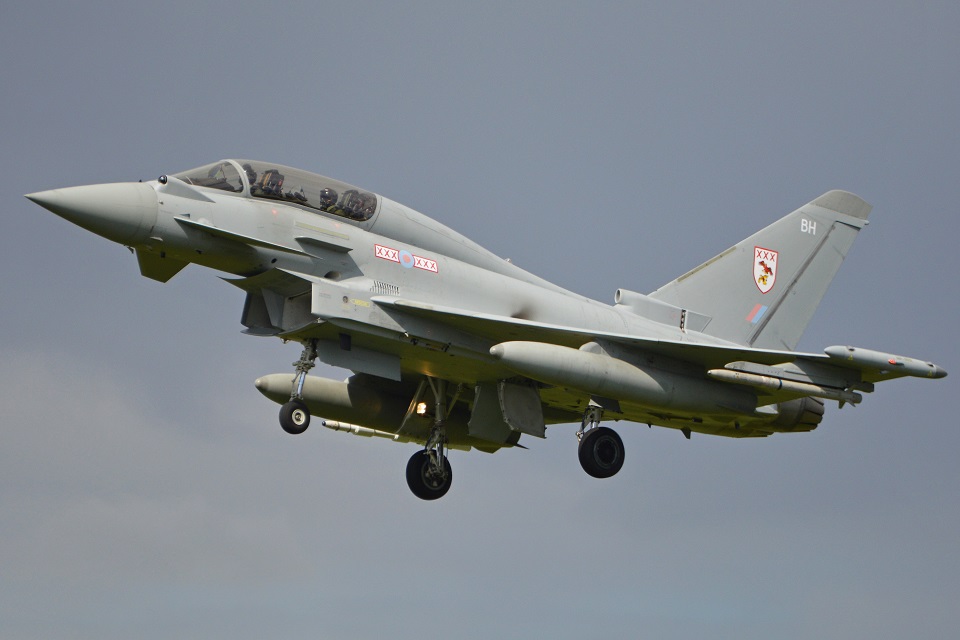
Turkey has declared that it is in negotiations with the UK and Spain to buy 40 Eurofighter Typhoon aircraft, but Germany may decide to block such a deal.
He stated, “We are working on procurement,” during an Ankara parliamentary hearing. “Although we are not in talks with Germany, the UK and Spain are now trying to persuade Germany… We intend to buy forty Eurofighter Typhoon aircraft, if it’s possible.”
Turkey is seeking assistance from the United Kingdom and Spain, two Eurofighter co-manufacturers. Negotiations are likely to take place during President Recep Tayyip Erdogan’s November 17, 2023 visit to Germany.
Concurrently, Turkey is in talks with the US to purchase 40 F-16 Block 70 Vipers and modernise 79 existing aircraft. Congressional objections, fueled by concerns about the S-400 acquisition and Turkey’s political stances, put doubt on the deal.
Turkey clearly needs more fighters to strengthen its air force, and it wants them sooner rather than later, regardless of what happens.
Aerospace
Lufthansa and BBJ Set New Standards with VVIP Cabin Concept at Dubai Airshow

Lufthansa Technik AG and Boeing Business Jets (BBJ) have released the complete specifications of their latest VVIP cabin concept for the BBJ 777-9 in advance of the Dubai Airshow, which takes place starting next week.
With an overall surface area of nearly 340 square meters, the interior’s new renderings showcase a design that is especially suited to the needs of a new generation of head-of-state and VVIP aircraft. The finished designs incorporate classic elements from the Middle East’s rich cultural legacy with a contemporary twist, and they have finally revealed the new concept’s name.
Lufthansa Tech Designs VVIP cabin concept for the BBJ 777-9
The new cabin design’s standout feature is the cocoon-like Private Bed- and Bathroom, which, along with the adjacent Work&Balance space, create the VVIPs’ multipurpose Private Suite.
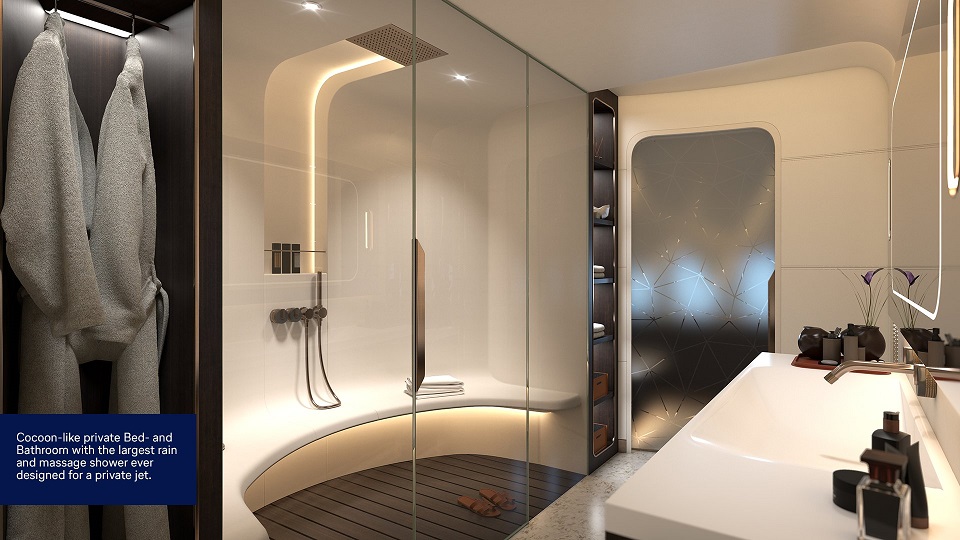
If the VVIP passengers want to enjoy the largest rain and massage shower ever designed for a private jet or make themselves at home in the generous king-size bed, the bathroom and sleeping quarters can merge into a self-contained retreat offering the greatest possible privacy.
Particularly eye-catching are the large window shades with electrochromatic dimming, which are fully integrated into the oriental-inspired design of CelestialSTAR. With their three-dimensional structure and the targeted use of indirect lighting, they continue the design principle of the side walls in a functional way, thus delivering a generous spatial impression all-around, even when closed and without daylight.
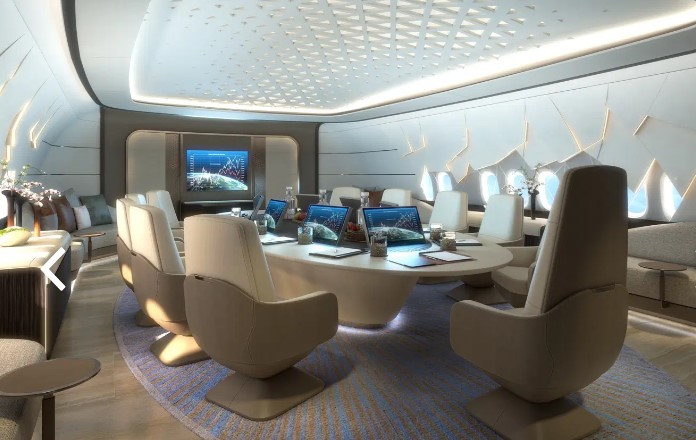
Aerospace
Embraer Hosts the 2023 China Regional Aviation Forum
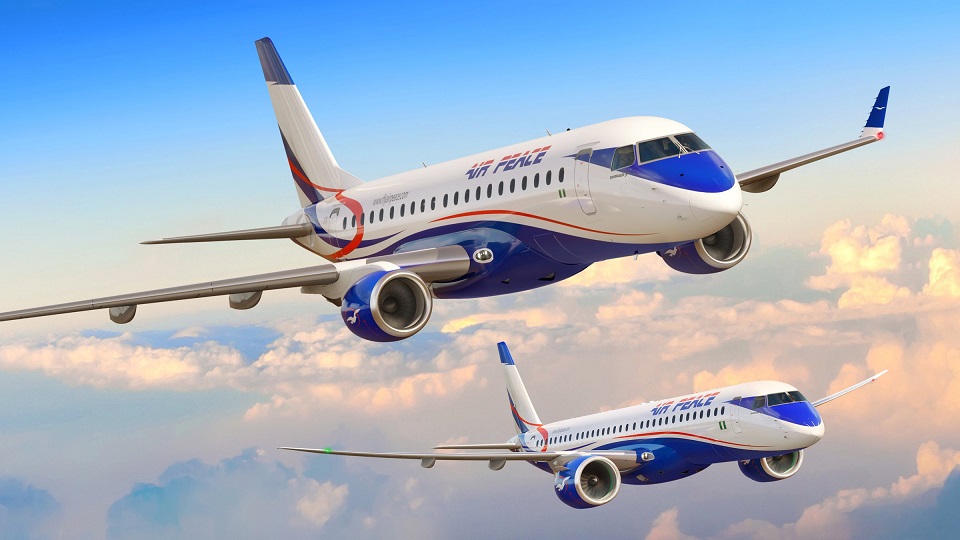
· The first post-pandemic Embraer China Regional Aviation Forum will be held in Qingdao 7-8 November.
·150 participants from home and abroad.
·The forum pools the wisdom and experience of the most qualified and knowledgeable people on a variety of topics ranging from regional aviation market development to successful business models and experience sharing for airlines.
On November 6th, 2023, in Qingdao, China, the first post-pandemic Embraer China Regional Aviation Forum is returning as China’s civil aviation market continues to grow, fueled by rising domestic demand.
6th China Regional Aviation Forum (RAF 2023)
Embraer is organizing the 6th China Regional Aviation Forum (RAF 2023) in the city of Qingdao from November 7th to 8th, 2023. The event’s theme is “Connectivity and Differentiation – New Momentum in Regional Aviation Development.”
The forum is set to welcome over 150 participants from government agencies, domestic and overseas airlines, airports, lessors, institutes, trade associations, and other relevant organizations.
Speakers will include airline executives, industry experts, and think tanks, who will lead discussions on various topics, including the development of the global and China regional aviation market, successful business models, and sharing experiences among airlines.
Arjan Meijer, President and CEO of Embraer Commercial Aviation, stated, “Embraer is providing a platform through the forum that gathers the wisdom and experience of the most qualified and knowledgeable individuals to discuss and debate how to expand regional networks and boost connectivity.
The key is to offer efficient and rightsized aircraft to build China’s connectivity. The E2, which complements China’s indigenous products perfectly, is the ideal aircraft for achieving this, as it will connect second and third-tier cities, as well as remote regions.
China Civil Aviation embrace a more sustainable aviation future
With both the E190-E2 and E195-E2 certified by CAAC, we are confident about our prospects in China, supporting growth and helping China Civil Aviation embrace a more sustainable aviation future.”
Guo Qing, Managing Director and VP Commercial Aviation at Embraer China, commented, “We believe the regional market is a key driver of future growth. There are one billion people living in China who have never taken a flight.
China Civil Aviation Authority places significant importance on the integration of the overall network, connecting trunk and regional routes to feed traffic to each other. In this context, our E2 aircraft will be an efficient tool to assist small and medium-sized airlines in focusing on the regional segment by differentiating their business models, market access, product, and service offerings.”
The China Regional Aviation Forum was previously held in Kunming, Yinchuan, Guiyang, Ordos, and Sanya. This year’s event is being jointly organized by China Aviation News and Civil Aviation Management Institute of China (CAMIC).
Aerospace
Meet Vikram-1, India’s indigenous rocket with the height of a 7-storey structure
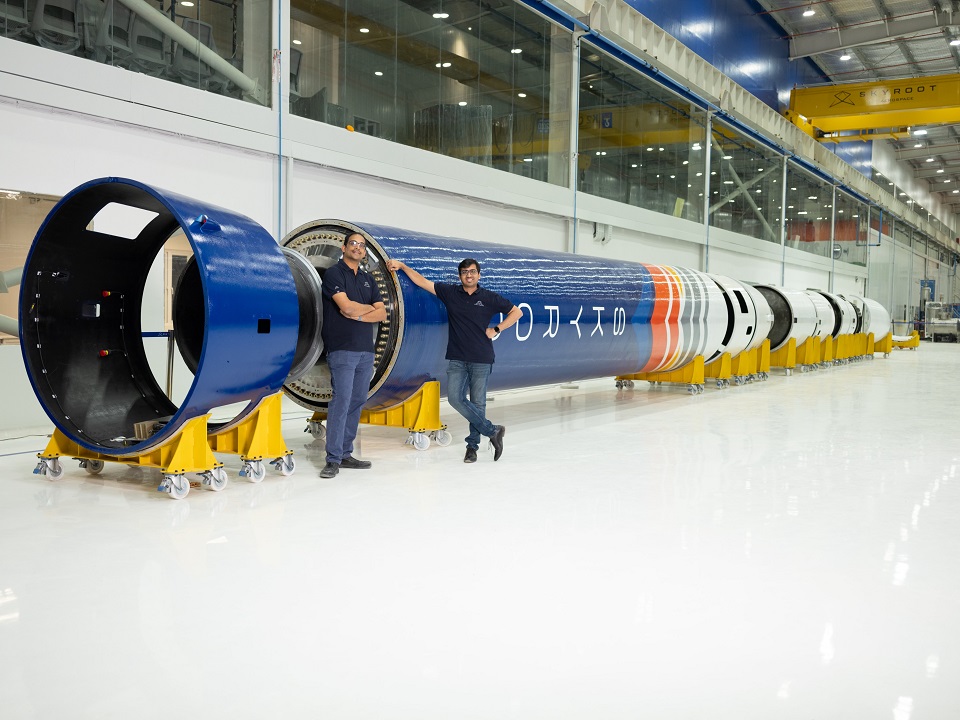
Skyroot Aerospace is preparing to fire its first orbital space launch vehicle in the first quarter of 2024. Skyroot Aerospace made history last year when it launched Vikram-S, India’s first privately manufactured rocket, into space.
The seven-story, multi-stage launch vehicle Vikram-1, which can carry up to 300 kg of payload and send satellites into lower earth orbit (LEO), was unveiled on Tuesday by the Hyderabad-based firm.
Early in the next year, Vikram-1 is anticipated to transport satellites into low-Earth orbit. Singh had a tour of Skyroot’s 60,000 square foot headquarters, which is claimed to be the biggest private rocket development centre in the nation. It has 3D-printed liquid engines and an all-carbon fibre body that can launch numerous satellites into space.
Vikram 1 might be launched between February and April as a result of two important experiments that need to be completed in the coming months. Vikram 1 will use a blend of liquid fuel in the upper stages and solid fuel in the lower stages to propel the rocket into orbit. We’ll go forward based on the results of these testing. “We will not be using the entire 300-kilogram payload capacity on this first launch because our goal is to acquire additional data through observations,” Dr. Jitendra Singh stated.
According to the CEO, “Skyroot Aerospace has raised about ₹526 crore in capital to date, and this should be good for the commercial launch.” Its own testing facility is intended to be located here in the future.
The space company, which recently opened its fourth facility, now has four locations with a combined built-up size of 100,000 square feet, making it one of the biggest rocket development centers in the private sector worldwide.
-
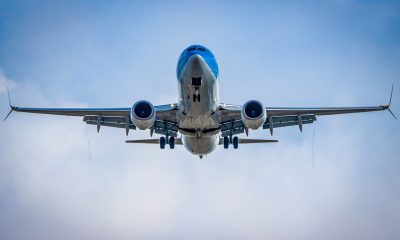
 Civil Aviation2 weeks ago
Civil Aviation2 weeks agoTop 7 stories of this week in Aviation Industry
-
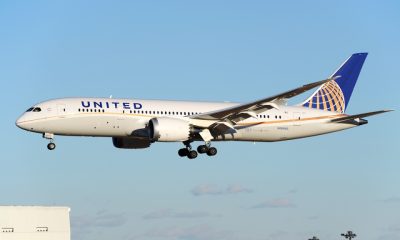
 Travel4 weeks ago
Travel4 weeks agoUnited Flight diverted, after dog poops on board
-
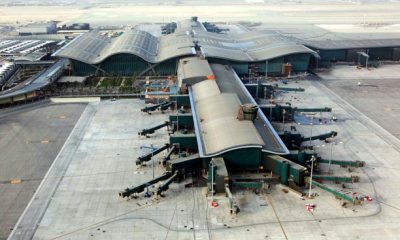
 Civil Aviation2 weeks ago
Civil Aviation2 weeks agoHamad International Airport Recognised as the “World’s Best Airport” at the 2024
-
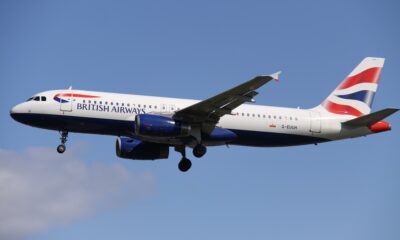
 Travel3 weeks ago
Travel3 weeks agoBritish Airways Unveils Exclusive Status Match for US and Canadian Travelers
-
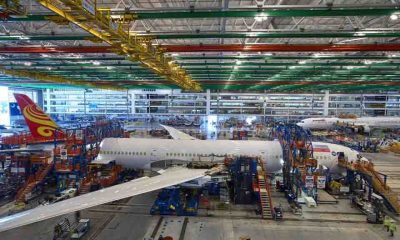
 Civil Aviation3 weeks ago
Civil Aviation3 weeks agoBoeing Under Scrutiny: Whistleblower Reveals Shortcuts in Production Process
-
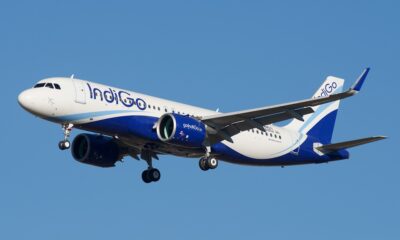
 Travel2 weeks ago
Travel2 weeks agoDoes Indigo Airlines Use Extra Salt in Their Food? Here’s the Answer
-
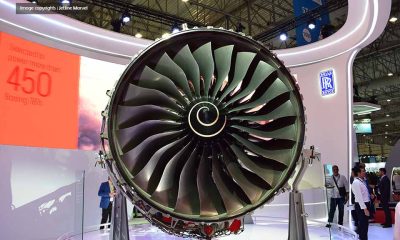
 Civil Aviation3 weeks ago
Civil Aviation3 weeks agoTop 10 powerful engines in the world
-

 Civil Aviation4 weeks ago
Civil Aviation4 weeks agoQantas’ New Safety Video Draws Online Criticism
-
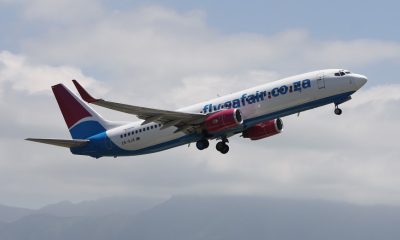
 Civil Aviation2 weeks ago
Civil Aviation2 weeks agoFlySafair B737 Flight Makes Emergency Landing After Losing Wheel During Takeoff
-

 Aerospace4 weeks ago
Aerospace4 weeks agoNASA’s Ambitious Plan to plant trees in moon
-
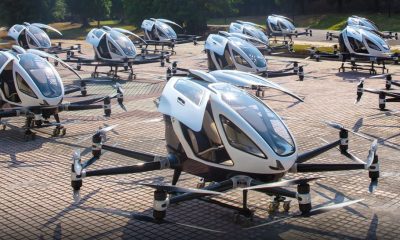
 Tech1 week ago
Tech1 week agoChina will produce flying taxi like Mobile phones in 2025
-
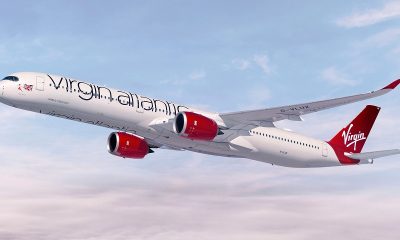
 Travel4 weeks ago
Travel4 weeks agoVirgin Atlantic’s India Expansion: Bengaluru Added, Mumbai Doubled

